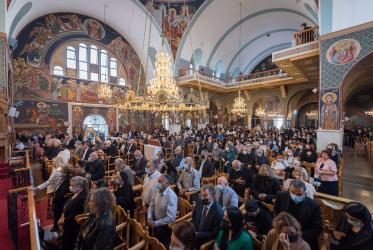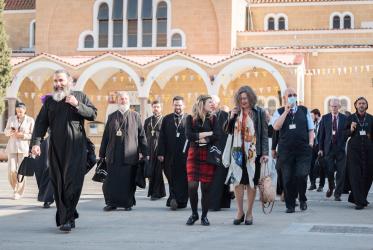by Constantine B. Scouteris
Documents from Sub-committee III
(Chania, Crete, August, 2000)
(1) The World Council of Churches, being a large communion of churches, naturally allows, and in many cases encourages, the expression of a variety of opinions according to specific historic, cultural and other circumstances. Ecclesiological pluralism was always the way and the modus operandi of the WCC. This means clearly that the Council has never been understood as a "Super Church". It has been stressed from the beginning that the family of the churches which constitute the WCC represent various ecclesiological positions differing from one another in theological principles and presuppositions. It has been set forth in many tones that the WCC "is not a new church (even less a Super Church) and does not perform ecclesiastical functions.1 In the Constitution of the Council it is said that: "The World Council shall not legislate for the churches", while in the official explanatory memorandum it is stated that the Assembly and the Central Committee "will have no constitutional authority whatever over its constituent churches".2
(2) Such an understanding of the WCC leads us to the conclusion that the Council arose as an absolutely new phenomenon, a fellowship (koinonia) of churches. This fellowship has its own unique character and is without precedent in Church history. The Council has been created to have its own specific perspective and its own unique and characteristic vocation and task. The establishment of the Council manifested the desire for rapprochement, for overcoming the painful divisions and also for a common service of the Christian gospel. In fact the foundation of the WCC reveals and realises the hopes and the dreams which had been previously expressed by church leaders and many people of widely differing ecclesiastical backgrounds and traditions. Inductively we mention the "Encyclical Letter" of the Ecumenical Patriarch in 1920, by which he has proposed the creation of a koinonia of the churches. A year earlier, in 1919, Archbishop Söderblom had written: "What I advocate is an Ecumenical Council of Churches. This should not be given external authority but would make its influence felt in so far as it can act with spiritual authority. It would not speak ex cathedra, but from the depth of the Christian conscience." Thus, the Council appeared as a place of collaboration of the churches in order to face the challenges of the time and the world.
(3) The scriptural term which corresponds to the word "fellowship" is the Greek "koinonia". Koinonia in the New Testament means "to share something in common". It basically indicates two forms of sharing: (a) sharing on a material level (Rom 15: 26; 2 Cor. 9: 13; Heb. 13: 16), and (b) sharing on a level which transcends material interests. This latter form of communion is often described as a communion with God the Father, Christ, or the Holy Spirit (1 Cor. 1: 9; 2 Cor. 13: 13; Phil. 3: IO; 1 John 1: 3-6). It has its inward quality in what is termed a "mystery of gathering together" and is expressed in the eucharistic participation. The cup of blessing which we bless, is it not the communion of the blood of Christ? the bread which we break, is it not the communion of the body of Christ? For we, being many, are one body; for we all partake of that one bread" (1 Cor. 10: 16-17). In the mind of the apostolic church, the eucharist, ecclesial body and fellowship, constitute a divine-human interpenetration. Such an understanding of fellowship is a recurring theme throughout Christian history and especially in patristic thought.
(4) When the WCC was born in the year of 1948, its founders adopted the word "fellowship" to designate the new body. The Council has been described as "a fellowship of churches which accept our Lord as God and Saviour". But soon after its formation, questions began to arise concerning the status of the newly created Council. The questions were certainly approached with a sense of great responsibility and urgency. The result of this search was the production of a statement, adopted by the Central Committee at Toronto in 1950, on "The Church, the Churches and the World Council of Churches".3 I think one is justified in calling attention to the Toronto statement for basically two reasons: (a) it clearly defined the relation of the member churches to one another within the fellowship; (b) it created a theological framework where a deeper understanding of such a "fellowship of churches" could be explored. From the Toronto Statement, as well as from the Statement of the WCC's Second Assembly (Evanston), is clear that the fellowship of churches within the WCC is not a communion in the biblical-patristic sense, i.e. in eucharistic fullness. It is rather a fellowship "in progress". It is a fellowship challenging and calling the churches towards the goal of the visible unity, for the full eucharistic communion.
With the creation of WCC, this unique fellowship or body, the member churches were called to express, through their common work and their common witness, their already existing unity, while at the same time they had the vocation to work and prepare the way for an ever deeper understanding of that unity and for a fuller coming together. From an Orthodox point of view, the creation of WCC is linked to the dream and desire for visible unity. It is within this perspective of full unity, through dialogue and serious theological investigation, that we must consider the expansion of the original Christological position which had been set forth in its Constitution as the basis for the Council's existence into a Trinitarian one. The Trinitarian formulation encompasses a broader range of Christian belief. It is not a clarification or amplification of an abstract doctrinal formulation but a further step towards a fuller and more stable fellowship, in so far as throughout the entire Christian tradition the one God in Trinity has always been considered as the Alpha and the Omega of the life of the church. It is from the Trinitarian God that the life of the church springs.
(5) From an Orthodox view point, the Council's role has always been understood as that of preparation and facilitation. The Council has from the beginning of its existence sought to serve the churches as an instrument, to lighten their task and their way towards the one eucharistic fellowship. According to the Toronto declaration, the purpose of the Council is "to bring the churches into contact with one another and to promote discussion of questions of Church unity". The initial vocation of the Council was to transform, through theological dialogue, the indifference to the need for ecumenical fellowship and unity into a deep, conscious conviction that Christianity itself, in its very essence, is unity. Isolation and disunity are anomalies which can only be understood as the result of sin and evil. It is interesting to note that in patristic thought sin and evil have, in general, been described as decomposition, disorganization and a dissolution of the unity created by God. This disunity, as a disrupted condition, leads to selfishness and to a sectarian, monistic understanding of the Christian gospel. In this perspective the task to promote unity is not always an easy one, given that our societies are pluralistic, and as such they easily accept or encourage diversity. Thus, often theological justification of diversity are welcomed, while in many cases the need for unity is under-stressed. The way towards unity is, unfortunately, often considered to be an illusion or as a religious utopia or, in some cases, as something not of first importance or, even worse, as something unnecessary. Many supporting arguments are brought forward, as for example the often expressed position that in the New Testament one cannot find a single ecclesiology or that one can see there more support for diversity that for unity, etc.4
I think that one of the most important and comprehensive declarations of the Council in connection with this commitment to serve the churches on their way towards union was that adopted by the Assembly in Nairobi (1975). This declaration, the result of work extending over many years, is included in the Council's Constitution and describes its function in a very positive way. According to this affirmation, the World Council has the vocation "to call the churches to the goal of visible unity in one faith and one eucharistic fellowship expressed in worship and in common life in Christ, and to advance towards that unity in order that the world may believe". When we talk of "one faith and one eucharistic fellowship", we mean that this serious ecumenical attempt should not be reduced to the level of sentimentality nor to that of simple "academic" discussions. The way towards the one faith presupposes serious theological dialogue and common theological work.
(6) When we speak of common theological work, we designate both that work done within the Council on its own initiative and with the participation of various people from various churches as well as that work done outside the Council but through its mediation. As examples of the first case, one can cite the work of various international consultations within the Faith and Order Commission leading to an agreement on baptism, eucharist and ministry as well as the project "Towards the Common Expression of the Apostolic Faith Today", an attempt to move towards a deeper understanding and explication of the apostolic faith as it has been expressed in the Nicene-Constantinopolitan Creed (325 and 381). In the second case one can note the mediation of the WCC and the assistance rendered by it in order to make possible the fruitful theological discussions between the Eastern Orthodox churches and the Oriental Orthodox churches. It must be stressed here that it became increasingly apparent during the history of the WCC that the churches, in order to achieve a fuller mutual fellowship, must honestly confront their differing convictions. They also have the spiritual responsibility to confess afresh the one apostolic faith. The declaration of the Vancouver Assembly is very significant: the churches are called "to share a common understanding of the apostolic faith, and be able to confess this message together in ways understandable, reconciling and liberating".
(7) When considering the Word Council of Churches, we must always bare in mind that it has within itself basically two traditions which, despite their differences in character, theological and historico-cultural visions, have in common a considerable number of fundamentals which inwardly unite them. Eastern and Western Christendom, despite their quite different evolutions, share a common Christian inheritance. This unique theological and historical reality can be a source of spiritual strength challenging the dominance of materialism in our contemporary world. It is our urgent duty to realize that our Christian commitment requires us to be honest to God, to our churches and to our vocation to work together.
(8) In the last few years there have been developments in the WCC that alarmed the Orthodox. The concern for theology and the outlook for fellowship and union has been set forth by some means in second place and moreover forgotten or considered a utopia. The Council has shown itself to be more concerned for current matters dealing with societal and political concerns. This is not a negative aspect, when it is the result of theological research and when, it is based on the Christian tradition and faith. The problem arose when the WCC functioned many times as a clearly human-oriented organization estranged from its Christian origins. This problem may have been helped by the fact that during the last two decades, many small churches, one may say peripheral, were introduced into the Council either did not have any theological substructure or even worse, had comparative tendencies. Truly, many times the Orthodox felt that when communicating with these churches we were speaking a whole different language and more specifically, that the basis of our common faith was being lost.
Thus, the Orthodox progressively were found in a Council of Churches, that was more or less a Council and even less of Churches. Some said that it is a Council of Churches and non-Churches. The concern for theological matters and for issues of common faith and unity have been limited to the Faith and Order Commission, which more or less is able to influence the whole body of the Council. Of course, the work of the Commission was often important, but remained marginal and undeveloped. If one adds to these issues, the arithmetical inferiority of the Orthodox, the difficulties become more understandable. With the 25% which was given to the Orthodox churches it is obvious that they could not effectively project their opinions. Thus, we Orthodox are beginning to feel alienated by an organization in which we trusted and in the founding of which we had played a leading role and had struggled for.
(9) I believe we are in a critical turning point for the World Council of Churches. The answer to the problems and the cure of the weaknesses that we all perceive depends on if we truly want (and to what degree) to put our finger on the problems and to take decisions which will be harmonious to our Christian conscience. In the WCC there are basically two Christian traditions, the eastern and the western. Each is necessary for the other and certainly enriches with its theory and its practice the common effort and the common witness in the world. The dilemma in which we are in demands a clear decision and answer. There is no room for diplomacy, reconciliation or interim solutions. We live in an age where the world does not tolerate juxtaposition and hypocrisy. The question is simple, can we as Christians communicate and set a new and genuine common basis for our cooperation, so that our witness in the modern world can have results? I believe that our common faith in the Gospel of Christ allows us to be optimistic.
Notes:
- Statement of the Evanston Assembly, 1954.
- See W. A. Visser't Hooft, "The Significance of the World Council of Churches". The Universal Church in God's Design, p. 181. Quoted by T. Sartory, The Oecumenical Movement and the Unity of the Church, Oxford 1963, pp. 22-23.
- See The EcumenicaI Review, 3 (1950), pp. 47-53.
- L. Vischer, "If Time Permits. Report on Christian Union", The EcumenicaI Review, 23 (1971), p. 144.




